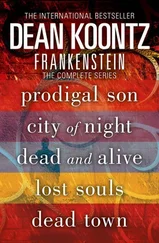“It's okay,” she whispered. “Lummox will be all right."
He closed his eyes again and seemed asleep, but then as she clicked off the lamp, he murmured, “You have your halo again."
In the morning, after Agnes showered and dressed, when she went downstairs, she discovered Barty already at the kitchen table, eating a bowl of cereal while riveted to the book. Finished with breakfast, he returned to his room, reading as he went.
By lunch, he had turned the final page, and he was so full of the tale that he seemed to have no room for food. While his mother kept reminding him to eat, he regaled her with the details of John Thomas Stuart's great adventures with Lummox, as though every word that Heinlein had written were not science fiction, but truth.
Then he curled up in one of the big armchairs in the living room and began the book again. This was the first time he had ever reread a novel-and he finished it at midnight.
The following day, Wednesday, December 27, his mother drove him to the library, where he checked out two Heinlein titles recommended by the librarian: Red Planet and The Rolling Stones. Judging by his excitement, on the way home in the car, his response to previous mystery-novel series had been a pleasant courtship, whereas this was desperate, undying love.
Agnes discovered that watching her child be totally consumed by a new enthusiasm was an unparalleled delight. Through Barty, she had a tantalizing sense of what her own childhood might have been like if her father had allowed her to have one, and at times, listening to the boy exclaim about the space-faring Stone family or about the mysteries of Mars, she discovered that at least some part of a child still lived within her, untouched by either cruelty or time.
Shortly before three o'clock, Thursday afternoon, in a state of agitation, Barty raced into the kitchen, where Agnes was baking buttermilk-raisin pies. Holding Red Planet open to pages 104 and 105, he complained urgently that the library copy was defective. “There's twisty spots in the print, twisty-funny letters, so you can't just exactly read all the words. Can we buy our own copy, go out and buy one right now?"
After wiping her floury hands, Agnes took the book from him and, examining it, could find nothing wrong. She flipped back a few pages, then a few forward, but the lines of type were crisp and clear. “Show me where, honey."
The boy didn't at once answer, and when Agnes looked up from Red Planet, she saw that he was staring oddly at her. He squinted, as if puzzled, and said, “The twisty spots just jumped off the page right up on your face."
The formless apprehension with which she had awakened at 1:50, Tuesday morning, had returned to her from time to time during the past couple days. Now, here it came again, pinching her throat and tightening her chest-at last beginning to take form.
Barty turned away from her, surveyed the kitchen, and said, “Ah. The twisty is me."
Halos and rainbows loomed in her memory, ominous as they had never been before.
Agnes dropped to one knee before the boy and held him gently by the shoulders. “Let me look."
He squinted at her.
“Peepers open wide, kiddo."
He opened them.
Sapphires and emeralds, dazzling gems set in clearest white, ebony pupils at the center. Beautiful mysteries, these eyes, but no different now than they had ever been, as far as she could tell.
She might have attributed his problem to eyestrain from all the reading he'd done during the past few days. She might have put drops in his eyes, told him to leave the books alone for a while, and sent him into the backyard to play. She might have counseled herself not to be one of those alarmist mothers who detected pneumonia in every sniffle, a brain tumor behind every headache.
Instead, trying not to let Barty see the depth of her concern, she told him to get his jacket from the front closet, and she got hers, and leaving the buttermilk-raisin pies unfinished, she drove him to the doctor's office, because he was her reason to breathe, the engine of her heart, her hope and joy, her everlasting bond to her lost husband. Dr. Joshua Nunn was only forty-eight, but he had appeared grandfatherly since Agnes had first gone to him as a patient after the death of her father, more than ten years ago. His hair turned pure white before he was thirty. Every day off, he either worked assiduously on his twenty-foot sportfisher, Hippocratic Boat, which he scraped and painted and polished and repaired with his own hands, or puttered around Bright Bay in it, fishing as though the fate of his soul depended on the size of his catch; consequently, he spent so much time in the salt air and sun that his perpetually tan face was well-wizened at the corners of his eyes and as appealingly creased as that of the best of grandfathers. Joshua applied the same diligence to the preservation of a round belly and a second chin that he brought to the maintenance of his boat, and considering his wire-rimmed eyeglasses and bow tie and suspenders and the elbow patches on his jacket, he seemed to have intentionally sculpted his physical appearance to put his patients at ease, as surely as he had selected his wardrobe for the same purpose.
Always, he was good with Barty, and on this occasion, he teased more than the usual number of smiles and giggles from the boy as he tried to get him to read the Snellen chart on the wall. Then he lowered the lights in the examination room to study his eyes with an ophthalmometer and an ophthalmoscope.
From the chair in the comer, where Agnes sat, it seemed that Joshua took an inordinately long time on what was usually a quick examination. Worry so weighed on her that the physician's customary thoroughness seemed, this time, to be filled with dire meaning.
Finished, Joshua excused himself and went down the hall to his office. He was gone perhaps five minutes, and when he returned, he sent Barty off to the waiting room, where the receptionist kept a jar of lemon- and orange-flavored hard candies. “A few of them have your name on 'em, Bartholomew."
The subtle distortions in his vision, which caused lines of type to twist, didn't appear to trouble Barty much otherwise. He moved as quickly and as surely as ever, with his special grace.
Alone with Agnes, the physician said, “I want you to take Barty to a specialist in Newport Beach. Franklin Chan. He's a wonderful ophthalmologist and ophthalmological surgeon, and right now we don't have anyone like that here in town."
Her hands were locked together in her lap, gripped so tightly for so long that the muscles in her forearms ached. “What's wrong?"
“I'm not an eye specialist, Agnes."
“But you have some suspicion."
“I don't want to worry you unnecessarily if-"
“Please. Prepare me."
He nodded. “Sit up here.” He patted the examination table.
She sat on the end of the table, where Barty had sat, now at eye level with the standing physician.
Before Agnes's fingers could braid again, Joshua held out his darkly tanned, work-scarred hands. Gratefully, she held fast to him.
He said, “There's a whiteness in Barty's right pupil ... which I think indicates a growth. The distortions in his vision are still there, though somewhat different, when he closes his right eye, so that indicates a problem in the left, as well, even though I'm not able to see anything there. Dr. Chan has a full schedule tomorrow, but as a favor to me, he's going to see you before his usual office hours, first thing in the morning. You'll have to start out early."
Newport Beach was almost an hour's drive north, along the coast.
“And,” Joshua cautioned, “you better prepare for a long day. I'm pretty sure Dr. Chan will want to consult with an oncologist."
“Cancer,” she whispered, and superstitiously reproached herself for speaking the word aloud, as though thereby she'd given power to the malignancy and ensured its existence.
Читать дальше











